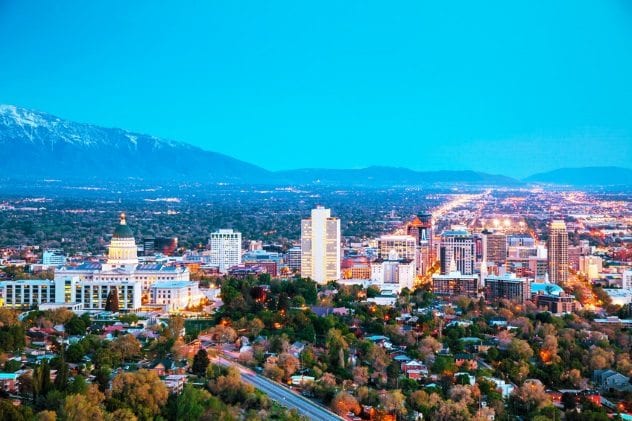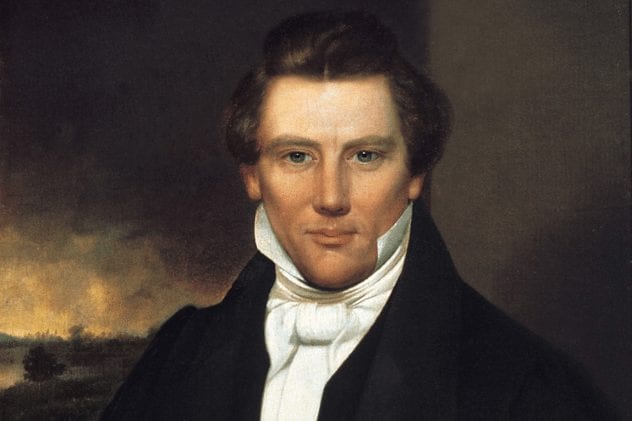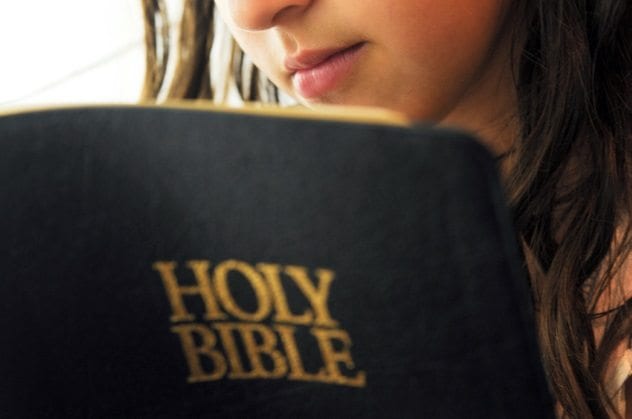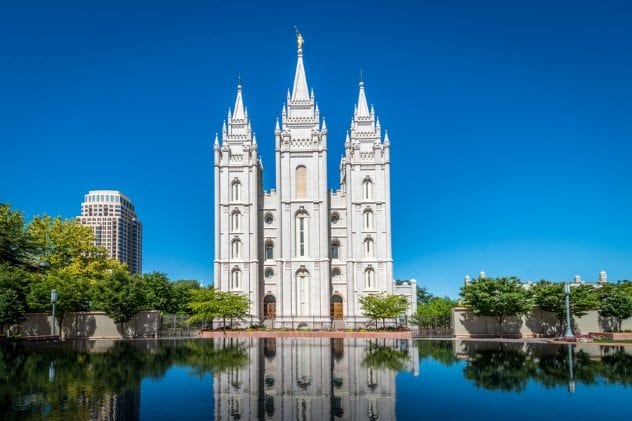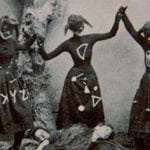10 Mormons Are Polygamists
It is true that the church once accepted the practice of polygamy and encouraged it among its members, but the practice was removed in 1890. This was accomplished after numerous confrontations between the church and the Utah and federal governments. Since the new Manifesto outlawing the practice of plural marriage was revealed, polygamy has remained against church policy. A second manifesto was required in 1904 after then–church president Joseph F. Smith testified before the US Congress and disavowed polygamy. Since that time, only groups who are considered “fundamentalists” (but not Mormon and therefore not associated with the church) continue the practice. Any Mormon found to be continuing the practice of plural marriage is excommunicated.
9 Join The Church, Move To Utah
Ever since the great migration of Mormons to Utah in 1846, the population of the state has favored the congregation considerably. The Mormon population of the “Beehive State” is approximately 62 percent, and the headquarters of the church is located in Salt Lake City, the state’s capitol. While the majority of US Mormons live in Utah, there are congregants in each state and over 100 countries across the globe. Of the nearly 15 million members living all over the world, the majority reside outside of Utah and in other countries. Living in Utah is not a requirement to join the church as many believe. It is not uncommon for Mormons living outside of Utah to travel there at least once in their lives, but this isn’t required, either.
8 Mormons Can’t Use Birth Control
Mormon families tend to have more children than average. In the United States, it is common for a Mormon family to have 3.4 children, while Christian families tend to average only 2.3. The church teaches that it is the responsibility of every Mormon to encourage family growth, which is one of the reasons Mormon families tend to be bigger than most. This has led to the misconception that Mormons, like Catholics, cannot use birth control measures to limit pregnancies. Mormons do not limit birth control, but they do place restrictions on birth termination. The church teaches that the intimacy between a husband and wife is between them and God, so it is entirely their decision how many children they wish to have. Like any family, planning tends to go into the decision, and if birth control is desired, it will be used.
7 Women Are Subservient In Mormonism
The treatment of women in Mormonism has been the subject of much criticism over the years. This has led to several misconceptions about the status of women and their roles within the church and family. Outside of the fundamentalist groups, which treat women quite horribly, the church has seen an evolution in women’s roles. When the church was founded in the early 19th century, there were limits on women’s rights as there were throughout US society. As the Suffragette movement and feminism gained momentum, the role of women slowly began to change. The modern church has adapted to include women in previously male-only areas such as scholarships to Brigham Young University, speaking at the General Conference, and the appointment of women to the executive council. Changes have come slowly, but the church is catching up to a more modern idea of equality.
6 The Mormon Church Is Racist
The Mormon Church was founded during a time when slavery was legal in the United States. The church embraced slavery and even suggested, like many other religious leaders of the time, that slavery was endorsed by God. Fortunately, the times have changed, and slavery has been abolished, but that did not help to change church policy toward black members until fairly recently. As a result, the modern incarnation of the church has been viewed as racist, but this is a misconception. Prior to 1978, black congregants could not be ordained into the lay priesthood, nor were they allowed to partake in temple ordinances. A revelation to Spencer W. Kimball in 1978 pushed him to change church policy and lift all race restrictions. The church of today opposes all forms of racism and has no policies whatsoever limiting race. Approximately three to five percent of the congregants are of African descent, many of whom reside within Africa.
5 Mormons Worship Joseph Smith And Consider Him Holy
People with only a passing familiarity with Mormonism tend to know a little something about Joseph Smith. The misconception about his reverence in the faith tends to lead people to believe that he is held to the same level of divinity as Jesus, but this is not the case. Mormons consider Joseph Smith to be the founder of the faith and a great prophet but do not see him as divine in any way. Mormons see prophets as fallible people who are earthly men called by God for a holy duty to man. They are not perfect nor held to the same standard as Jesus. A passage in the Doctrine and Covenants 135 may have led to this misconception: “Joseph Smith [ . . . ] has done more save Jesus only, for the salvation of men in this world.”
4 Mormons Don’t Believe In The Bible
Because of the Book of Mormon, some people believe that Mormons do not “believe” in the Christian Bible. Mormons believe the Bible is the word of God—but with a few caveats. Mormons believe the Bible contains errors. These errors entered into the text as it was compiled, translated, and transcribed over the centuries. Regardless of any errors a Mormon perceives, the Bible is one of four revered texts that comprise the doctrine of faith. The Book of Mormon, the Doctrine and Covenants, and the Pearl of Great Price as well as the words of modern prophets and apostles all make up the faith. The biggest difference between the church and other branches of Christianity is that Mormons believe that the Revelation from God didn’t stop with the Bible. It continued in the Book of Mormon as translated by the church’s founder, Joseph Smith.
3 Caffeine Is Forbidden
This misconception comes from the Mormon dietary code known as the “Word of Wisdom,” which established a ban on “hot drinks.” The church has clarified that “hot drinks” refers specifically to coffee and tea, not to caffeine. Mormons do not partake in tobacco and alcohol, but they can drink and consume caffeine as much as they like. The church espouses healthy living among its congregants and does offer dietary guidelines, which helps to fuel this sort of misconception. Because caffeine is not a consideration in the ban on hot drinks, Mormons cannot consume decaffeinated tea or coffee but can consume whichever soda they like. Many have interpreted the Word of Wisdom to also ban iced teas and coffee as well.
2 Mormons Practice Strange Rituals
There is an element of secrecy to Mormon rituals and ordinances, which has helped to further the misconception that they practice strange rituals in their temples. Mormons do practice some activities which can only take place in their temples and are not exposed to outside scrutiny. These ordinances include baptisms, confirmations, marriage (sealing), prayer circles, and many others. When compared to other religions, Mormon practices do not differ in any strange and unusual way. Most services like Sunday worship are open to the public. Those practiced inside temples are not, but that doesn’t make them different or unusual.
1 Work Will Take You To Heaven
The general consensus within all Christian faiths is that a belief in Jesus as the Savior and/or the desire for forgiveness for past sins will allow a baptized person into Heaven. There is a misconception of Mormonism that work will earn a place in Heaven regardless of a person’s journey toward salvation. Priests and prophets have interpreted the Book of Mormon and other teachings over the years to find that certain “works” will help to elevate one’s position to obtain the highest exaltation in the Kingdom of God, but performing these works is not necessary to achieve a place in Heaven. These works include or have included providing baptisms for the dead, marriage within the church, keeping the Commandments, and plural marriage (which, as previously mentioned, is no longer practiced). Read More: Twitter Facebook Fiverr JonathanKantor.com

